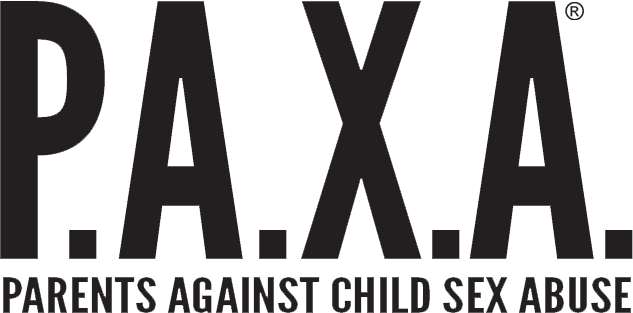Where to go and what to do when you need help
PAXA wants to make sure that all families are supported in their ultimate moment of crisis: when they discover that child is being sexually abused. It’s disorienting, confusing and highly emotional - and there is often intense pressure to protect a predator’s reputation over the wellbeing of a child. Sexual abuse is a crime: report it. Let the authorities determine if it was “just a big misunderstanding.” Here are some ways to make sure that the child is protected, abuse stops, and the entire family can start on the path to healing.
Circumstances may include:
An uncomfortable situation that you may think involves child sexual abuse;
Your child being in an uncomfortable environment that is high risk for your child concerning sexual abuse;
You feel it’s time to report speculated child sexual abuse or exploitation case to someone with confidentiality;
You see seek professional services like a trained therapist/counselor who address what you believe are symptoms of abuse or a trauma/PTSD.
You’re not crazy. Let the authorities determine if it was a “misunderstanding”
We’re tired of parents and care takers getting shamed for calling with concern or raising the issue of inappropriate behavior towards a child. We’re also tired of society protecting adults or older children over the well being of a younger child. Trust your gut and report what you saw, no matter how uncomfortable the situation may be. You might later learn that this behavior has been reported.
If you’ve witnessed child sexual abuse or it’s happening in your home
Call 9-1-1. There’s no harm in taking this action if you believe there is danger or harm in your presence.
If you need to talk to someone to vet a situation before you decide what action you need to take:
Call 800-656-HOPE (4673). It is managed by non-profit R.A.I.N.N., Rape Abuse & Incest National Network. It is a safe and confidential service. If you’d don’t feel like talking, they offer a confidential 24/7 Live Chat option via their website: online.rain.org
If you seek to report child sexual abuse, you can do so via your state’s Child & Family services hotline:
The role of the state’s child and family services department is to keep children safe from harm. For many this is the first step before the police and law enforcement get involved. Keep in mind they may move slower than you would like. While you feel the urgency of the matter, they are handling hundreds of cases, with some kids in more dangerous situations than others. Take note of the case number and get an email address so you can to begin documentation via email correspondence.
If you want to report the crime, you can file a police report:
In our work, we’ve learned that not all police departments have the same level of training about child sexual abuse as others. However, you still have the right to file a police report first or at the same time as the Child & Family services agency. Both organizations do or should communicate. Please don’t take your child to the police station.
If you want to seek counseling for your child:
It can be very hard for some to find the help they need for their child. We’ve even heard parents say to us that they wouldn’t even know where to start looking. We have the shortcuts for you so you can move faster to get your child the support he/she needs to heal:
Contact your local Children’s Advocacy Center.
They are a tremendous resource in the area of child sexual abuse. They work closely with Child & Family Service agencies and law enforcement. We discovered that they could be better utilized by parents directly for support.
Contact your child’s Pediatrician.
We strongly encourage that parents keep pediatricians in the loop regarding their child’s behavior or any concern. Ask your pediatrician for a list of counseling practices. Contact the practice or center and ask about their specialty areas so your child can get matched up with the optimal counselor.
If your child is healing from child sexual abuse trauma, ask for a therapist or counselor that specializes in trauma because these practices don’t always list it on their website.
